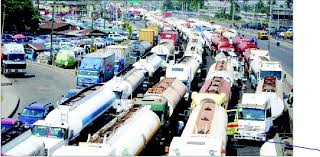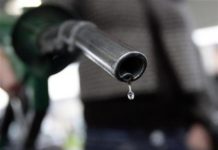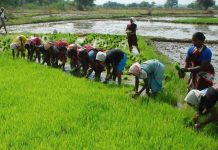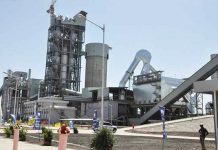
PEBEC’s Claims In Tatters With New $300m Loss To Gridlock
Nigeria’s economic hub is Lagos State, with the busiest gateway lying situate at Apapa, one of the state’s suburb. It’s roads, irrespective of their economic importance, are simply like “roads leading to nowhere.” For typical Nigerians, with “can do spirit”, risks are meant to be taken and indeed, they are bearing the risks. Despite the indispensability of Apapa Ports, several governments have played to the gallery when it comes to renewing its infrastructure base to ensure continued cash flow. The current administration, with four years gone, is also one.Recently, the Presidential Enabling Business Environment Council (PEBEC) acknowledged how its campaign led to increased registration of businesses to 75,380 businesses in 2016, from 34,531 in 2006. It also regaled the media with successes in reducing time required to start a business in Nigeria from 30 days in 2013, to 11 days in 2018.
Granted, these are worth mentioning, but in the last four years, even in the face of dwindling foreign exchange inflow, the long-standing negligence to challenges associated with export of items, particularly, through the major port – Apapa Ports, have not received the desired and global best practice attention it deserved.
Presently, gridlock and inefficiency at the ports delayed shipment of 50,000 tonnes of cashew nuts valued at $300 million and now threatening this year’s output targets, as traders are cash-strapped.The commodity, which was last year’s harvest, was due for export by January, but according to the Nigeria Cashew Exporters Association, is still in the containers on trucks waiting to enter the ports or on wharves, till March 28, 2018.
According to Bloomberg, the delay is likely to affect the output target of 260,000 tonnes, while the President of the association, Tola Faseru, is now calling on President Muhammadu Buhari to intervene and save their businesses from imminent collapse.“Roads to Lagos ports are badly congested, with hundreds of lorries queuing to enter the premises and either deliver or pick goods. Inadequate capacity and infrastructure, stifling red tape and corruption are hampering export processes,” he said.
An exporter Tony Adi, retorted: “Please tell them, in case they don’t know, that ease of doing business is not only about registering businesses. It is about seamlessness in getting value from the businesses registered without undue encumbrances.
“After registering a business, you struggle to produce and end up losing the products. What is the ease of doing business in all of these? I am afraid the country is moving in the cycle of poor prioritization due to selfishness of the leadership, cluelessness of appointees and lack of political will.“Why is the country not hitting the 100th position it is long aspiring in the world ranking on Ease of Doing Business? If the country cannot build a place for these errant tanker drivers, is the government not capable of controlling them? They are only sabotaging their own policies, because they are the owners of these tankers,” he said.
A former Minister of Finance, Dr. Ngozi Okonjo-Iweala, on reading the signs of dwindling crude oil fortunes towards the end of 2014, quickly declared the country austere and scripted set of tax opportunities inherent in luxury items, as part of palliatives for government’s imminent fiscal crisis. Unfortunately, she did not pursue the plan to logical conclusion, as it would require legislative pronouncements.
Nigerian-born Dr. Philip Emeagwali, according BrainyQuote, once said: “Nigeria is a West African nation of over 100 million energetic people. It is endowed with lots of natural resources, but lacks human resources.”Indeed, the observed lack of human resources by the don, is not all about certificates and exposure, but may well include the obvious dearth of self and political will and ingenuity, needed to transcend any seeming impossibility.
“PEBEC was introduced against the backdrop of renewed campaign for economic diversification. Although it has a thousand and one priorities to achieve its aim, it appears not to be strategic, because its priorities are not adding up.“The lack of real diversification in the country has only revolved around evolving efficient strategy, commitment and implementation.
“It is the mediocrity seen around the corridors of power overtime, that has no ground, much-less of standing the ground, and has nothing to offer, but would not quit for anything, including obvious incompetence. That is the setback of Nigeria’s diversification and it is far from over,” a major exporter, who would not want his name in print, said.In a routine of losses that appear unending, the Nigerian Logistics and Supply Chain Industry, recently estimated N3.4 trillion yearly shortage caused by poor infrastructure, policy implementation and corruption at the nation’s ports.
The report published by Africa Centre for Supply Chain (ACSC), stated that the profit margin of corporate entities, especially those who make use of the Lagos ports, have gradually declined, as a result of increased costs of logistics.The Director-General, Africa Centre for Supply Chain, Obiora Madu, while speaking to The Guardian, said the deficit in infrastructure and decadence is a true reflection of leadership negligence.
He said these challenges, on the other hand, point to loses to exporters as well, especially those dealing with agricultural produce, as they lose $10 billion yearly, resulting from gridlocks on ports access roads, with containers bearing these produces spending weeks and eventually, fail to get access to the port terminals on time.
Specifically, in fourth quarter of 2018, the cost of hauling 40ft container within Lagos went up by 400 per cent, from N120,000 to between N550,000 and N600,000. The development was also similar in transporting containers to different parts of the country, which rose about 66.7 per cent and 120 per cent for a 20ft container to Kaduna and Onitsha respectively.
It would be regrettable to know that right in front of the nation’s major gateway- Apapa ports, export-bound non-oil commodities lose value due to unending gridlock, caused by combined lame strategy, non-prioritisation of projects, poor enforcement of rules and lack of effective implementation of policies.The continued siege by the drivers of articulated vehicles to one of the most important road networks in the country’s economic nerve center- Lagos State, is nothing short of dearth of ideas and tacit admittance by the country’s leadership failure at all levels. It betrays the acclaimed successes in the ease of doing business.
A motorist, who identified himself as Otalor, described the long years of Apapa gridlock as a show of shame to the country, especially as billions of naira, “including the possible over invoicing,” were spent on the construction of the highway few years ago, but now surrendered to “illiterate tanker drivers, by weak and selfish leaders.”“We only have leaders who do not think about the link between gridlock and man-hour losses and cannot correlate them in terms of naira and kobo. They only count money when they want to embezzle it, not for development. Nigeria’s diversification and ease of doing business is only a story and scam,” he said.

































